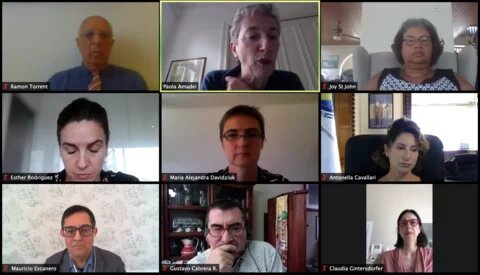Q/: How will the G20, ECOSOC, the Global Alliance redefine their post-Covid-19 development cooperation agenda and what will be the role of Team Europe for LAC?
A/: The European Investment Bank Group announced in April the details of a comprehensive response to the coronavirus pandemic outside the EU, contributing up to 5.2 billion euros in the coming months. This funding is part of Team Europe's response and is supported by the EU budget. Our response is aimed at strengthening urgent investments in health and accelerating long-term support for private sector investment, reflecting funding needs in more than 100 countries worldwide. The European Investment Bank's post-COVID-19 development cooperation agenda will continue to have the fight against climate change as its main focus, including for example support to the renewable energy sector or water and sanitation. In parallel, we will continue to accompany the countries of the region in a sustainable solution to the COVID-19 crisis. With regard to the future of "Team Europe" for Latin America, we will shortly be awaiting indications from the European Commission regarding the multiannual financial framework that will guide the Bank's intervention in the region. In any event, collaboration between the European Union Delegations, the Member States and the European Investment Bank has been strengthened in order to provide a coherent and harmonised European response.
Q/: Do you think the pandemic and recession will narrow or widen the gap between the two regions? In other words, will the situation lead to an increase in welfare from Europe or will it put the regions in a more symmetrical situation?
A/: It depends largely on the responses that we, the CELAC countries and the EU, articulate, both within our regions and in the areas of bilateral, triangular, bi-regional and multilateral cooperation. It is clear that both regions will benefit from working together towards a global response. The challenge we share is twofold: not only to address the urgent issues in a framework of solidarity but, going forward, to correct the global social deficits and to build a more equitable and sustainable development. To that end, international cooperation and multilateralism, in complement to regional and national efforts, are indispensable. And in this context, CELAC and the European Union, based on our shared values and aspirations, can and must play a leading role.
Q/: Do you think that digital diplomacy would be necessary to promote meeting points between international leaders in order to face the challenges resulting from the pandemic and to meet the need to adhere to the Sustainable Development Goals, do you think that digital diplomacy contributes to the development of multilateral spaces, do you think that digital diplomacy is directly related to the economic and social development of countries and could contribute to the reduction of social inequalities?
A/: In the face of global challenges, we need to strengthen our international cooperation and multilateralism and move towards an increasingly equitable and sustainable global governance. The implementation of Agenda 2030 is an indispensable step on that path. To this end, we must mobilize all our resources and knowledge and, where appropriate, make full use of the technological tools and digital communication methods available to us in all areas, including, of course, in the exercise of our diplomatic and social communication efforts. In this last respect, considering your possible interest, we are pleased to share this publication with you: https://www.gob.mx/cms/uploads/attachment/file/495328/Diplomacia_publica_en_280_caracteres.pdf
